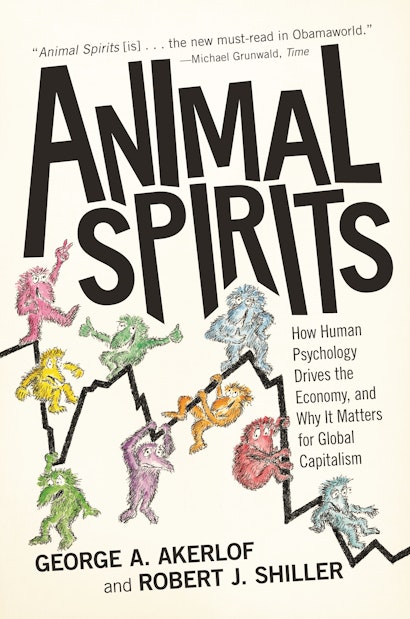"Akerlof and Shiller are the first to try to rework economic theory for our times. The effort itself makes their book a milestone."—Louis Uchitelle, New York Times Book Review
"There is barely a page of Animal Spirits without a fascinating fact or insight."—John Lanchester, New Yorker
"Akerlof and Shiller succeed, too, in demonstrating that conventional macroeconomic analyses often fail because they omit not just readily observable facts like unemployment and institutions such as credit markets but also harder-to-document behavioral patterns that fall within the authors' notion of 'animal spirits.' Confidence plainly matters, and so does the absence of it. When the public mood swings from exuberance to anxiety, or even fear, the effect on asset prices as well as on economic activity outside the financial sector can be large."—Benjamin M. Friedman, New York Review of Books
"Two of the most creative and respected economic thinkers currently at work, George Akerlof and Robert Shiller, . . . [have written] a fine book at exactly the right time."—Clive Crook, Financial Times
"A truly innovative and bold work. . . . At a time when plummeting confidence is dragging down the market and the economy, the authors' focus on the psychological aspect of economics is incredibly important."—Michael Mandel, BusinessWeek
"Animal Spirits [is] . . . the new must-read in Obamaworld."—Michael Grunwald, Time
"[Animal Spirits] really applies to all the big areas where we need change."—Peter Orszag, Obama budget director (quoted from, Time
"White House Budget Director Peter Orszag is a numbers guy, a propeller head as President Obama would say. But as David Von Drehle and I write in this week's print version of Time, Orszag has been spending his time recently reading not about spreadsheets, but about psychology. In particular, he has been reading a new book by the economists George Akerlof and Robert Shiller called Animal Spirits: How Human Psychology Drives The Economy, and Why It Matters For Global Capitalism. . . . We are, it turns out, slaves to the Animal Spirits. They have brought us to our knees. And now they are the only things that can save us."—Michael Scherer, Time.com's Swampland
"In their new book, two of the most creative and respected economic thinkers currently at work, George Akerlof and Robert Shiller, argue that the key is to recover Keynes's insight about 'animal spirits'—the attitudes and ideas that guide economic action. The orthodoxy needs to be rebuilt, and bringing these psychological factors into the core of economics is the way to do it. . . . The connections between their thinking on the limits to conventional economics and the issues thrown up by the breakdown are plain, even if they were unable to make every link explicit. Even more than Akerlof and Shiller could have hoped, therefore, it is a fine book at exactly the right time. . . . Animal Spirits carries its ambition lightly—but is ambitious nonetheless. Economists will see it as a kind of manifesto."—Clive Crook, Financial Times
"An influential Democrat who was also one of the world's top-ten, highest-paid hedge fund managers last year thinks he knows which book is at the top of the White House reading list this spring: Animal Spirits, the powerful new blast of behavioural economics from Nobel prize-winner George Akerlof and Yale economist Robert Shiller."—Financial Times
"Akerlof and Shiller remind us that emotional and intangible factors—such as confidence in institutions, illusions about the nature of money or a sense of being treated unfairly—can affect how people make decisions about borrowing, spending, saving and investing. Animal Spirits is an affectionate tribute to the man [John Maynard Keynes] whose ideas, unfashionable for the past 30 years, have resurged."—Nature
"Animal Spirits is a welcome addition to our Hannitized national economic debate, in which anyone who advocates government spending risks being labeled a socialist. . . . Animal Spirits is most compelling when the authors summon all the key behavioral patterns to explain vast, complex phenomena such as the Great Depression. . . . Animal Spirits . . . [is] aimed squarely at the general reader, and rightly so: Macroeconomics is now everybody's business—the banks are playing with our money."—Andrew Rosenblum, New York Observer
"[A] lively new financial crisis book."—James Pressley, Bloomberg News
"The two superstars have produced a truly innovative and bold work that attempts to show how psychological factors explain the origins of the current mess and offer clues for possible solutions. At a time when plummeting confidence is dragging down the market and the economy, the authors' focus on the psychological aspect of economics is incredibly important."—Michael Mandel, BusinessWeek
"What Sigmund Freud did for the study of the mind, George Akerlof and Robert Shiller are doing for economics. Freud, healer or fake—take your pick—built a career and a field of medicine on the idea that people are driven by irrational forces. Akerlof, professor of economics at the University of California, Berkeley and winner of the 2001 Nobel Prize in economics, and Shiller, the Yale economist who is the eminence grise of the housing meltdown, argue that massive government market intervention programs are the only way to turn fear into enthusiasm for spending and investing—the 'animal spirits' that are an essential part of recovery. . . . Akerlof and Shiller pick up on the idea of the emotional impetus to investment. With elegant reasoning and lovely prose, they demonstrate that we'll all be wallowing in misery unless governments around world, especially the in the G7 nations, help to return markets to optimism. . . . Animal Spirits is a fine discussion of the last few decades of development of economic theory, especially monetary economics."—Andrew Allentuck, The Globe & Mail
"[T]his book is rather more than the usual lament about the failings of economics. Its authors are two of the discipline's leading lights. . . . Most of the time, the unrealistic assumption of rationality serves economists fairly well. They should, however, be more prepared to depart from it, especially in times like these—even if that makes behaviour more difficult to describe in elegant equations. Messrs Akerlof and Shiller have therefore done their profession a service."—The Economist
"With Animal Spirits we hone in on how incentives and narratives can be created to channel the human psychological factor into collectively healthy directions, and how to be aware of the fictions we tell ourselves about how we wish the world and greed and financial security worked. [Animal Spirits] sheds light on complex issues and leaves readers with a better grasp of undercurrents and—most importantly—a rediscovered belief in principles of common sense and caution."—Daily Kos
"The new book from George Akerlof and Robert Shiller, Animal Spirits, has been getting a lot of press of late, and quite rightly: it's really good. It's not only very readable; it also offers a compelling vision of a very different type of macroeconomics—one where behavioral considerations are front and center, rather than simply providing what Clive Crook calls 'ad hoc modifications' to the standard, ridiculously oversimplified and unrealistic, model. . . . [I]f you read only one book on this subject, make it Animal Spirits."—Felix Salmon, Portfolio.com
"As George Akerlof and Robert Shiller show in a new book Animal Spirits, this is no freak storm. It may mark the long-awaited encounter between psychology and economics. . . . Akerlof and Shiller's book is probably the first macroeconomic exploration of the subject that is accessible to those interested in the subject but who don't have the academic training to understand the detailed argument."—Mint
"My book of the week is an easy one this time around: it's Animal Spirits, by Robert Shiller and George Akerlof. . . . Admittedly, I'm biased as a fan of both Shiller's and Akerlof's. Believe me, however, when I say the blessedly brief Animal Spirits is a thoughtful and well-written look at how economics discarded psychology and lost its way on the trip from Adam Smith, through Keynesianism, to laissez-faire. The book puts the current crisis in a useful economic context, with consistent and practical selections from behavioral finance illuminating everything along the way. . . . Highly recommended."—Paul Kedrosky, SeekingAlpha
"Another contribution to the human-nature-ensures-economics-is-irrational school of thought. But, unlike many of the rants against people trying to make an honest profit, this is a measured examination of how the present crisis is explained in economic terms. And so it should be. George Akerlof is a Nobel prizewinner, Robert Shiller teaches at Yale and is the author of Irrational Exuberance, which should give you an idea of this one's approach. This fascinating work uses economics to explain real-life issues, such as real estate price cycles, to key policy problems, such as the relationship between inflation and employment."—Stephen Matchett, The Australian
"George Akerlof and Rober Shiller's Animal Spirits is a plea to start believing our lying eyes rather than the model. Rather than try to explain away the apparent irrationality in human behaviour, Akerlof and Shiller say we need to try to understand it and shape policies that take it into account. . . . The core message of Animal Spirits is that we should stop trying to cage the spirits and instead admit their central importance. Specifically, this means that world governments will need to intervene forcefully in the current economic crisis with both fiscal stimulus and direct measures to stimulate lending—to restore some of the confidence that the crash has sapped."—Matthew Yglesias, The National
"In saluting Keynes' quip, Akerlof and Shiller argue that much of the story is in the unreliability and incompleteness of supposedly rational behavior—the micro-foundation of the free-market model. They contend that modern economics, even self-described Keynesian economics, has given short shrift to this core behavioral insight. . . . Their best chapter is on the limited capacity of central banks to prevent or cure calamities."—Robert Kuttner, The American Prospect
"Akerlof and Shiller take psychological research seriously, and it's refreshing to see that they're not trying to reinvent the wheel. . . . The book is an interesting read and would probably be very useful for an undergrad class that needs an introduction to behavioral economics. A & S do a nice job of moving between the theoretical and the practical, the empirical and the implied. The writing is accessible and the topic is more than relevant to our current economic situation."—Orgtheory.net
"Animal Spirits is succinct, clear and lively."—Brad Willis, Edmonton Journal
"In an intriguing new book, Animal Spirits, US economists George Akerlof and Robert Shiller argue that psychology plays a far bigger role in determining economic outcomes than economists realize—and that, broadly speaking, people get what they expect. If we think good times are ahead, we act confidently in a way that creates them. And if we expect a downturn ahead, we act defensively and unwittingly ensure that's what we get."—Tim Colebatch, The Age
"The authors are right in pointing out the inadequacy of conventional economics in understanding, not to say addressing, today's economic woes, because they fail to take into account these animal spirits."—Wan Lixin, Shanghai Daily
"[Animal Spirits] is a short, thoughtful and sometimes simplistic book that calls for a different vision of economics. . . . Animal Spirits may well be a GPS system for a changing economic future."—Gene Rebeck, Delta Sky
"Animal Spirits presents a rigorous case for the importance of 'confidence multipliers' and 'stories' in explaining recent market behaviour and of 'fairness' and 'money illusion' in preventing wages from falling in recessions to the market-clearing rate. Written in an accessible style, the book provides a very useful practical primer for policy-makers, practitioners and academics on many aspects of the current crisis. The authors also make a compelling theoretical case for macroeconomists taking more account of the role of non-economic motives and irrational responses."—Richard Bronk, The Business Economist
"[T]he authors do a superb job of conveying the importance of bevaioural economics to a non-specialist audience. They increase our understanding of recent economic events and they show that animal spirits affect how governments should manage the economy."—Natalie Gold, Times Higher Education
"Animal Spirits offers a road map for reversing the financial misfortunes besetting us today. Read it and learn how leaders can channel animal spirits—the powerful forces of human psychology that are afoot in the world economy today."—Money Science
"[T]his very book seems to be one of the 'must-reads' in the Obama administration."—Andreas Ernst, JASSS
"Ideologists are likely to dismiss this volume. However, for other readers—whether their perspectives are quantitative or qualitative—Animal Spirits may fill a troubling gap in existing investigations of the causes of booms and busts."—Thomas H. Wilkins, Investment Professional
"Akerlof and Shiller's book is an interesting and thought-provoking attempt to understand how underlying human psychology drives the economy. The questions they pose and the examples they provide should be read by any economist seeking to better understand the differences between what economics predict will occur, and how people actually behave as individuals and within larger groups."—Dmitri Leybman, Midway Review
"Animal Spirits, which attempts to leverage the insights of behavioral economics to reanimate the vision of John Maynard Keynes, is perfectly timed for the present moment."—Nick Schulz, Wilson Quarterly
"Animal Spirits is exceptional in showing how economics can be accessible and relevant in dealing with this awesome challenge."—Irish Times
"George Akerlof and Robert Shiller have offered an attractive road map for a macroeconomics that might be inspired by the recent financial crisis."—Romar Correa, Economic & Political Weekly
"I believe this book to be best suited for those individuals who come from different fields but have a keen interest in economics and finance."—Kristina Vasileva, Journal of General Management
"It is perhaps the ultimate compliment to suggest that Russia's greatest writer would very much have agreed with Barany's depiction of the Russian military—and that his approach is a superior one for understanding Russian military politics."—John P. Moran, Perspectives on Politics
"More important than the timeliness of the book was the legacy that it leaves behind. This book helps us to understand as never before how macroeconomics really works."—Stan C. Weeber, Journal of Global Analysis
"Akerlof and Shiller deserve at least two cheers—one for providing a more solid psychological foundation for our understanding of confidence and another for re-introducing such an important concept into mainstream macroeconomics."—Martin Rapetti, Eastern Economic Journal
"This book is a sorely needed corrective. Animal Spirits is an important—maybe even a decisive—contribution at a difficult juncture in macroeconomic theory."—Robert M. Solow, Nobel Prize-winning economist
"This book is dynamite. It is a powerful, cogent, and convincing call for a fundamental reevaluation of basic economic principles. It presents a refreshingly new understanding of important economic phenomena that standard economic theory has been unable to explain convincingly. Animal Spirits should help set in motion an intellectual revolution that will change the way we think about economic depressions, unemployment, poverty, financial crises, real estate swings, and much more."—Dennis J. Snower, president of the Kiel Institute for the World Economy
"Animal Spirits makes a very timely and significant contribution to the development of a new dominant paradigm for economics that acknowledges the imperfections of human decision making, a need which the panic in financial markets makes all too apparent. I am not aware of any other book like this one."—Diane Coyle, author of The Soulful Science: What Economists Really Do and Why It Matters
"Akerlof and Shiller explore how animal spirits contribute to the performance of the macroeconomy. The range of issues they cover is broad, including the business cycle, inflation and unemployment, the swings in financial markets and real estate, the existence of poverty, and the way monetary policy works. This book is provocative and persuasive."—George L. Perry, Brookings Institution



